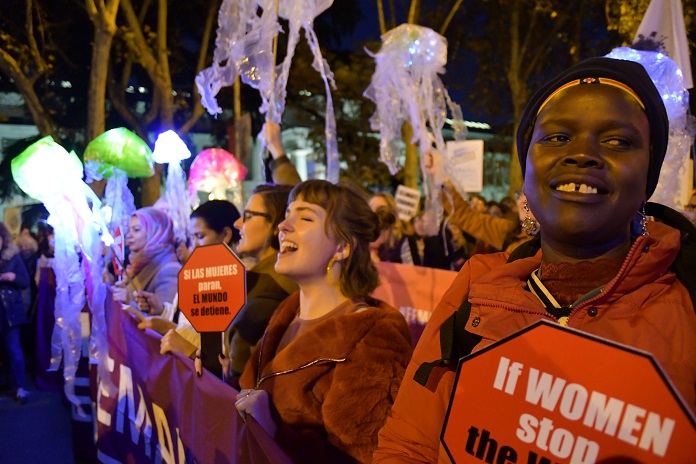By Mary Wandia, Policy Advisor on Civic Participation, ActionAid International
True democracy includes but is not limited to respect for the basic freedoms and responsibilities, the rule of law, due process, and orderly succession. How do we move beyond mere forms and institutions of democracy to make it meaningful and inclusive of the needs and desires of the people, especially women and young people?
Electoral processes with widespread barriers to civil and political rights are becoming the norm globally. This is characterized by trends such as unlimited and uncontrolled bans on protests or demonstrations against election results; internet/media shutdowns; propagation of conservative or pro-status quo narratives over politics; proliferation of fake news; arbitrary detention and unfair trials of activists; and the harassment, intimidation, defamation, and killings of human rights defenders.
State capture by economic and political elites has contributed to the undermining of trust in democracy by further unbalancing the playing field for political participation, particularly for women, young people, and other groups without access to financing.
The COVID-19 pandemic will disproportionally affect excluded groups, especially those that continue to face intersecting forms of discrimination based on gender, age, ethnicity, class, caste, occupation, migrant status, and religion. The exclusion of women and young people from electoral and democratic processes will be exacerbated by the pandemic.
This has become all too pervasive in both the Global North and the Global South. We risk resigning to a passive feeling of helpless acceptance. However, I propose that these trends behoove us to nurture a spirit of positive defiance, a readiness to confront that which is clearly wrong and which undermines the building of a just society.
I have been privileged to lead a process within ActionAid to get the people’s views and to jointly build an alternative narrative on inclusive democracy. This is the kind of democracy we want and that delivers for young people and women. Our alternative narrative draws from the experiences of women, young people, civil society and political parties 14 countries. It reflects the suggestions they made to challenge and disrupt the dominant narratives on democracy that are focused on form rather than substance.
Our vision of inclusive democracy and electoral accountability is one that shifts power from political and economic elites to citizens, particularly women and young people. Ultimately, it is a vision in which the belief in elections as a road to democracy and social change can be restored. This is critical to the realization of ActionAid’s mission – social justice, gender equality and poverty eradication.
Electoral accountability
Elections are important for civic participation as they provide a means for excluded groups to be heard and to influence the political agenda. Elections also provide a means for women and young people to influence social outcomes by ensuring the issues that matter most to them are on the agenda of those seeking electoral office. Elections provide an important mechanism to hold leaders to account and to ensure that elected officials use the power conferred on them to benefit the electorate.
Unfortunately, the experience for women and young people from the most marginalized and excluded communities has been one of failed promises, dashed hope, and a need for change.
Overarching disadvantages for women and young people are expressed through their lack of opportunities for political participation; the absence of spaces to voice their concerns; and under-representation in influential government positions. Other forms of systemic neglect of women and young people involve their exclusion from electoral processes through the absence or poor enforcement of relevant laws and policies; ineffective working of electoral management bodies; and the discriminatory attitudes of those who dominate those processes, institutions and systems.
Young people and women are not homogeneous groups, and certain young people and women are more affected by inequality and exclusion than others. Inequality and exclusion profoundly undermine young people and women’s opportunities to engage economically, socially and politically, and to exercise (or even secure) full citizenship. For this reason, laws, policies and strategies to increase electoral accountability should recognise and address the intersectionality of these identities and how they affect the enjoyment of rights.
Our vision of inclusive democracy and electoral accountability includes the following elements:
- Inclusive laws and policies are enacted, enforced and implemented.
- Independent electoral management bodies are responsive to the needs of women and young people.
- Independent judiciary and tribunals effectively adjudicate electoral disputes.
- Law enforcement bodies safeguard electoral integrity and security.
- Open and inclusive political parties.
- Respect for and protection of freedoms of speech, assembly, and association.
- Accountable elected leaders.
- Responsive civic education.
To achieve this vision of inclusive democracy, we need transformation to address the root causes of exclusion of women and young people. Address the visible forms of power, and pay attention to the hidden and invisible forms of power. We see this in the executive branch’s undue influence over electoral management bodies. There’s the hidden influence of economic elites over governments through illicit campaign financing. There’s the use of social media to spread fake news. And we know all too well the power of socialization, through family, schools, religion and culture, to uphold oppressive systems.
These are the types of hidden and invisible forms of power that we must focus on if we are to achieve this vision of inclusive democracy. Sustained momentum and potential for engagement of key stakeholders and actors in alliances to push power and to organize and engage a critical citizen mass can be used to advocate for an inclusive democracy. Women and young people must be at the forefront of bringing about that change.
